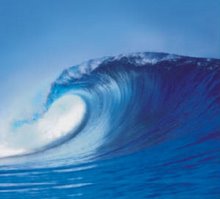Creation, Evolution, Life and the Sea
The story of the oceans and their importance in the evolution of life on earth begins eons ago on a primeval planet.
For millions of years the water that was squeezed out of the cooling crust evaporated and rained down upon the newly-formed rock. Ever seeking the lowest level it carved out paths to create riverbeds, collected in pools and slowly filled the large basins that formed as the molten rock cooled.
From the lush chemical cocktail that bubbled in the embryonic oceans came the stirrings of all life.... Fish, amphibian and reptile, warm-blooded bird and mammal - each of us carries in our veins a salty stream in which the elements are combined in almost the same proportions as in sea water. This is our inheritance from the day, untold millions of years ago, when a remote ancestor having progressed from the one-celled to the many-celled stage, first developed a circulatory system in which the fluid was merely the water of the sea. In the same way, our lime-hardened skeletons are a heritage from the calcium-rich ocean of the Cambrian time. Even the protoplasm that streams within each cell of our bodies has the chemical structure impressed upon living matter when the first simple creatures were brought forth in the ancient sea ...
Racheal Carson - Environmentalist
Millions of years later the oceans continue to act as a source and reservoir of the very components of life. This vast, seemingly inexhaustible storehouse still supports a greater variety of life than any other habitat in the world.
The biochemically balanced matrix of 84 macro and trace elements in sea water still exist in the body's plasma and cellular fluid, just as the life of every mammal still begins in the aquatic environment of a female's womb.
The biodynamic quality of sea water is demonstrated by its resistance to duplication in the lab. Sea life, from simple brine shrimps through to complex cetacean marine mammals, will not survive in a solution of refined or mine salt. No sea creature can.
The story of the oceans and their importance in the evolution of life on earth begins eons ago on a primeval planet.
For millions of years the water that was squeezed out of the cooling crust evaporated and rained down upon the newly-formed rock. Ever seeking the lowest level it carved out paths to create riverbeds, collected in pools and slowly filled the large basins that formed as the molten rock cooled.
From the lush chemical cocktail that bubbled in the embryonic oceans came the stirrings of all life.... Fish, amphibian and reptile, warm-blooded bird and mammal - each of us carries in our veins a salty stream in which the elements are combined in almost the same proportions as in sea water. This is our inheritance from the day, untold millions of years ago, when a remote ancestor having progressed from the one-celled to the many-celled stage, first developed a circulatory system in which the fluid was merely the water of the sea. In the same way, our lime-hardened skeletons are a heritage from the calcium-rich ocean of the Cambrian time. Even the protoplasm that streams within each cell of our bodies has the chemical structure impressed upon living matter when the first simple creatures were brought forth in the ancient sea ...
Racheal Carson - Environmentalist
Millions of years later the oceans continue to act as a source and reservoir of the very components of life. This vast, seemingly inexhaustible storehouse still supports a greater variety of life than any other habitat in the world.
The biochemically balanced matrix of 84 macro and trace elements in sea water still exist in the body's plasma and cellular fluid, just as the life of every mammal still begins in the aquatic environment of a female's womb.
The biodynamic quality of sea water is demonstrated by its resistance to duplication in the lab. Sea life, from simple brine shrimps through to complex cetacean marine mammals, will not survive in a solution of refined or mine salt. No sea creature can.


Nuk ka komente:
Posto një koment